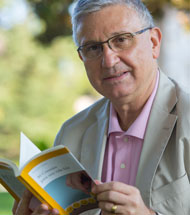20_10_05_EDU_esperanza
"It is a time to foster hope for better times and optimism. Human beings have survived great crises, and they will survive this one".
Fernando Sarráis, psychiatrist, psychologist and professor at the University of Navarra presents a new book with 30 practical tips for a happy life.

"I believe that after this crisis we will value more the social relationships of friendship and family; physical health; one's own work -even if it is not ideal-; cultural and educational community manifestations", says Fernando Sarráis, psychiatrist, psychologist and professor of the School from Education and Psychology. The expert from the University of Navarra believes that "human beings have survived great crises, and will survive this one", the important thing, he says, "is to take advantage of the experience to improve staff and collectively".
Sarráis states that "it is a time to foster hope for better times and optimism". Faced with the status we are currently living, full of fears, worries and uncertainty, we must resort to "the basic principles" that provide security, confidence and optimism and neutralize these fears. Some of these principles are: the love given to us by the people who love us, which is a sure thing and will always be there; culture, knowledge or the experience accumulated during our lives staff. Considering these realities, which we all have to a greater or lesser extent, is a great strategy to maintain mental health.
Dr. Sarráis goes on to state that "it is not enough to live, or to survive, but we must aspire to be happy, not only during vacations or parties, but every day of our lives", and explains that with the book "30 tips to be happy" he tries to balance the great interest in current health and physical well-being with the interest in achieving a mature, balanced and positive personality, on which happiness depends. In this publication he describes and explains 30 practical strategies to live positively, with peace and joy, some of which invite self-reflection, self-control and a sense of good humor development .
He insists on the need to think in order to discover the truth about oneself and the world around us, which allows us to live in the present moment. In this sense he points out: "I verify daily in my classes and conferences the scarce knowledge that people have on the functioning of the mind, especially of the affectivity -School very important of the personality - and it makes that some people are habitually positive and others are negative".
His committee to develop this skill is "to dedicate at least fifteen minutes a day to 'do nothing'. During this time, certain contents will appear in the conscience that we have no choice but to think about because they cannot be taken to internship at that moment. To delve into them, the core topic, explains Dr. Sarráis, is to ask oneself again and again "why?" and try to find an answer as sincere as possible. Thus, one can ask oneself: why am I sad or happy, or why have I done the things I have done today?
In this way, with perseverance, the process of introspection and self-knowledge, which "allows one to act in a way that is more in line with one's own objectives in life and to feel the protagonist of one's own existence, which is equivalent to feeling free", will take hold.
A sign that the habit of thinking is well developed, he adds, "is the ability to know right away why we act in a certain way and why we feel and think at every moment of our lives. With this ability to knowledge ourselves we can know if we are walking toward what makes us happy in the present, and will make us happy in the future."

